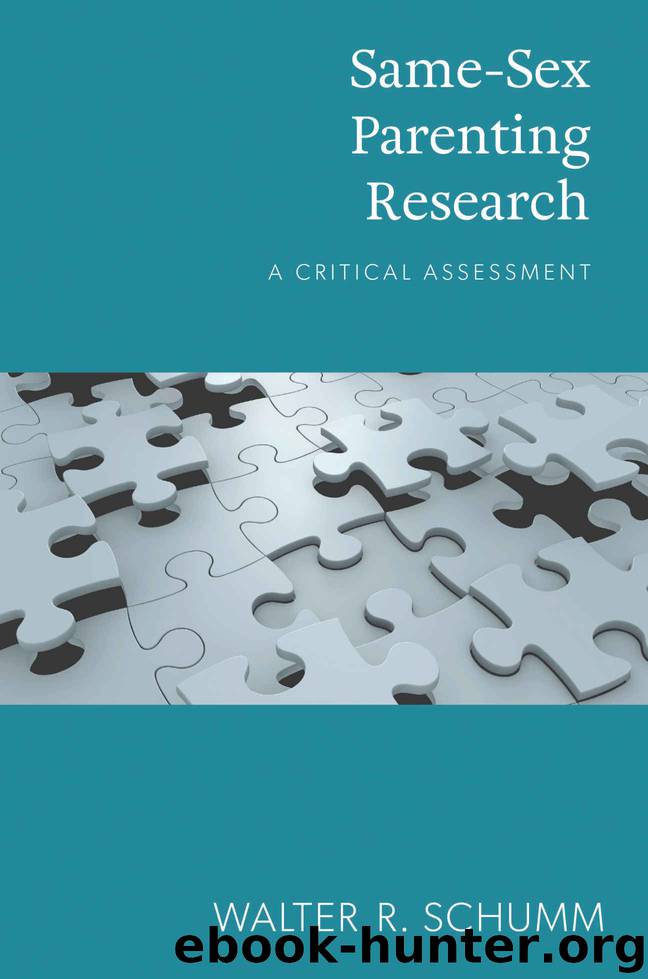Same-Sex Parenting Research: A Critical Assessment by Walter Schumm

Author:Walter Schumm
Language: eng
Format: mobi, epub
Tags: Religion
Publisher: Wilbrforce Publications
Published: 2018-09-25T22:00:00+00:00
Mental health
At least one study (Tan & Baggerly, 2009), of 733 adopted children, found that preschool children of lesbian mothers scored higher (less well off) on internalising problems (d = 0.37) and externalising problems (d = 0.33), including subscales for (more) aggressive behaviours (d = 0.80), being withdrawn (d = 0.80), and emotional reactivity (d = 0.47) than children of heterosexual parents. For their sample of older adopted children, results were less favourable for the children of lesbian mothers in terms of internalising problems (d = 0.44), externalising problems (d = 0.66), social problems (d = 0.37), thought problems (d = 0.72, p < .05), attention problems (d = 0.39), and combined problems (d = 0.49). Some studies featured mixed results; Goldberg and Smith (2013) found three of four problem scale ratings better for children of heterosexual couples (d’s between .01 and 0.16) but gay fathers rated their children lower on internalising problems than did heterosexual parents (d = 0.25). Other studies have found small effects in favour of the children of lesbian parents (Farr et al., 2010). Shechner et al. (2013) found that lesbian mothers in two-parent households rated their children higher on internalising problems (d = 0.14) but lower on externalising problems (d = 0.19) than did mothers from two-parent heterosexual families, a mixed but non-significant result. If coping well (assuming the child stays calm and in control when faced with a challenge) can be considered an aspect of mental health, even though Bos, Knox, van Rijn-van Gelderen, and Gartrell (2016) claimed that they had found no significant differences in mental health across the children of same-sex and heterosexual families in U.S. data, the children of heterosexual parents were rated by their parents better than were the children of same-sex parents (d = 0.34, p < .05), an effect that was stronger for daughters (d = 0.57, p < .05) than for sons (d = 0.11).
Sullins (2016b, c) in an analysis of ADD HEALTH data (albeit with only 20 adolescents from same-sex families) found that at wave IV of that study, adolescents with same-sex parents had higher rates of depression (d = .85, p = .001), suicidal ideation (d = .97, p = .04), obesity (d = .84, p = .009), and greater distance from one or both parents, usually the parent outside of the same-sex family (d = .71, p = .01), with the results for suicidal ideation, anxiety, and distance from parents persisting from wave I. Perceived stigma was much higher for the adolescents from same-sex families (d = 1.17, p = .01), which could account for some of the differences. When Sullins controlled for 12 variables (wave I depression, suicidal ideation, anxiety; parental child abuse, parental distance, and stigma; age, sex, race, education of adolescent; parent education, parent income) the effect of same-sex parenthood was reported in Table 3 (p. 5) to be nearly statistically significant (p < .10), but when he added obesity at wave IV as a 13th control variable, the results declined to non-significance.
Download
Same-Sex Parenting Research: A Critical Assessment by Walter Schumm.epub
This site does not store any files on its server. We only index and link to content provided by other sites. Please contact the content providers to delete copyright contents if any and email us, we'll remove relevant links or contents immediately.
| African-American Studies | Asian American Studies |
| Disabled | Ethnic Studies |
| Hispanic American Studies | LGBT |
| Minority Studies | Native American Studies |
Cecilia; Or, Memoirs of an Heiress — Volume 1 by Fanny Burney(31438)
Cecilia; Or, Memoirs of an Heiress — Volume 3 by Fanny Burney(31030)
Cecilia; Or, Memoirs of an Heiress — Volume 2 by Fanny Burney(30978)
The Great Music City by Andrea Baker(22608)
We're Going to Need More Wine by Gabrielle Union(18119)
Bombshells: Glamour Girls of a Lifetime by Sullivan Steve(13153)
Pimp by Iceberg Slim(12984)
All the Missing Girls by Megan Miranda(12825)
Fifty Shades Freed by E L James(12487)
Talking to Strangers by Malcolm Gladwell(11970)
Norse Mythology by Gaiman Neil(11952)
Crazy Rich Asians by Kevin Kwan(8405)
Mindhunter: Inside the FBI's Elite Serial Crime Unit by John E. Douglas & Mark Olshaker(7885)
The Lost Art of Listening by Michael P. Nichols(6523)
Enlightenment Now: The Case for Reason, Science, Humanism, and Progress by Steven Pinker(6442)
Bad Blood by John Carreyrou(5810)
The Four Agreements by Don Miguel Ruiz(5568)
Weapons of Math Destruction by Cathy O'Neil(5091)
We Need to Talk by Celeste Headlee(4916)
